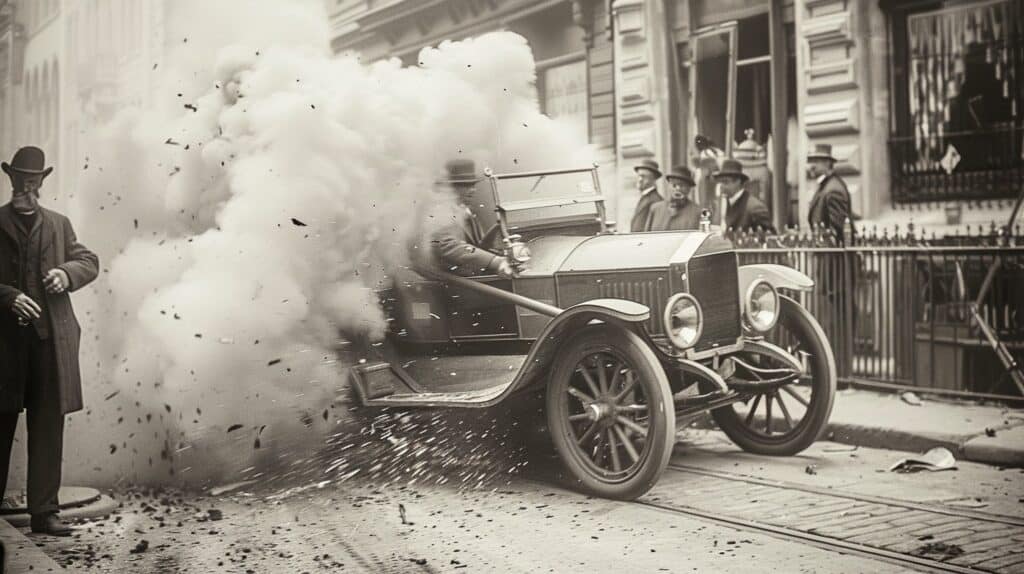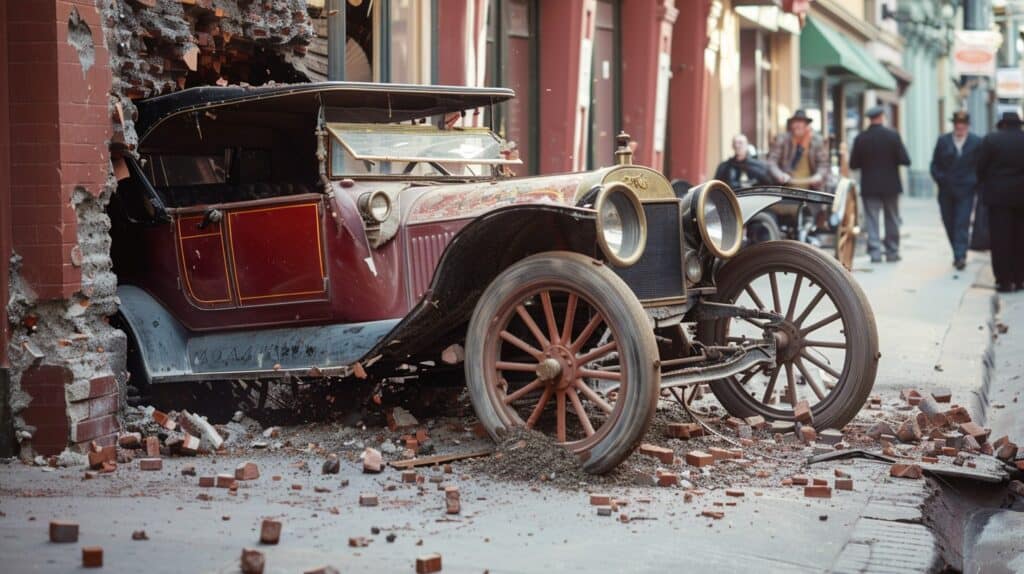Have you ever wondered about the first car accident? On May 30, 1896, a collision marked history in New York City. This post explores how this event sparked changes in auto safety.
Discover more below.
Key Takeaways
The first car accident happened on May 30, 1896, in New York City. This event started changes in auto safety.
Henry H. Bliss was the first person in the US to die after a car hit him on September 13, 1899. His death made people see cars as dangerous and think more about road safety.
Early accidents made governments and companies work to make roads and cars safer. They added seat belts, airbags, speed limits, and laws against drinking and driving.
Safety features in cars now link back to lessons learned from those first crashes. They help save lives on the roads today.
Table of Contents
Overview of the First Recorded Car Accident

The first car crash happened in 1896. It took place in New York City, setting a path for future auto safety measures.
Incident Date and Location of the First Car Accident
On May 30, 1896, New York City witnessed its first-ever vehicle collision. This event marked a pivotal moment in the history of cars. If you’re looking for advice after a similar mishap, “car accident lawyer near me” is a common search that can provide local legal help.
Exploring the First Fatal Car Accident

Dig into the story of Henry H. Bliss – his tragic death marks a turning point, forcing us to rethink road safety. Keep reading to find out how this event shook the world.
Details of the Fatal Accident Involving Henry H. Bliss
Henry H. Bliss met a tragic end in New York, becoming the first pedestrian in the United States to die after a car hit him. This happened on September 13, 1899. Bliss was stepping out of a streetcar and helping a woman onto the sidewalk when an electric taxi struck him.
Arthur Smith drove this automobile, and right after the accident, police arrested him for manslaughter. Despite this charge, courts later acquitted Smith.
This event marked a significant moment in auto accident history; it shed light on the dangers cars posed to pedestrians—especially at times when laws and safety measures were not as advanced as they are today.
Henry H. Bliss’s death urged cities to think more about how automobiles interact with people walking and using public transportation around them.
The Effects of Early Car Accidents on Public Perception and Safety Measures
Early crashes shocked people. They didn’t see cars as dangerous before. Now, they knew. This change in thinking led to action. Governments and companies began working on making roads and cars safer for everyone.
Safer belts came first; then airbags followed. Laws changed too, like speed limits and rules about drinking and driving. Companies made stronger car frames and better brakes to stop faster without skidding.
All these changes helped save lives on the roads.
Road deaths dropped because of these efforts. In 1970, over 50,000 people died in traffic in the USA alone. Now, thanks to safety measures like seat belts laws and anti-skid systems, that number is much lower despite more cars on the road.
These improvements didn’t happen overnight but grew from the tragedy of early crashes. Every safety feature in today’s vehicles links back to lessons learned from those first accidents—a journey from fear to better protection for drivers everywhere.
People Also Ask
When did the first car accident occur?
The first car accident happened in 1896. Henry Wells hit a bicyclist with his Duryea Motor Wagon.
Who was the victim of the first auto crash?
Mary Ward became a victim when she got thrown from a vehicle, in 1869.
How did early accidents change cars?
After these crashes, inventors added safety features to cars. Think seat belts and airbags.
What role do agencies like NHTSA play?
They set rules for car safety, making sure vehicles protect us during crashes.
Can modern technology prevent accidents?
Yes! Backup cameras and anti-lock brakes help drivers avoid collisions today.
Why are laws about seat belts important?
Seat belt laws save lives by keeping people secure during crashes.
References
- https://www.bodyshopbusiness.com/first-vehicle-collision-involved-car-bicycle/ (2017-05-30)
- https://www.myimprov.com/first-automobile-accident/
- https://www.smithsonianmag.com/smart-news/henry-bliss-americas-first-pedestrian-fatality-was-hit-electric-taxi-180964852/ (2017-09-13)
- https://en.wikipedia.org/wiki/Death_of_Henry_H._Bliss
- https://www.ncbi.nlm.nih.gov/pmc/articles/PMC3566732/
- https://injuryfacts.nsc.org/motor-vehicle/historical-fatality-trends/deaths-and-rates/



